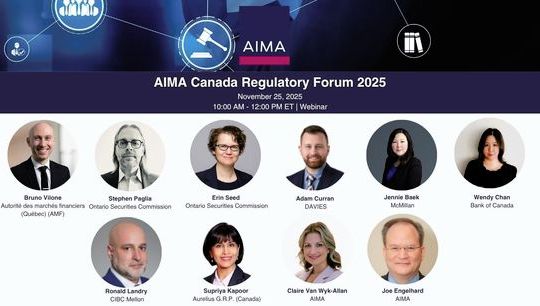2022 Review: Advocacy in action
Published: 14 December 2022
AIMA is proactively engaging with regulators on all live issues from the private fund advisers rule to securities lending and short selling reforms, among many other proposed rule changes
Private fund adviser proposal
In February 2022, the SEC proposed a series of rule amendments that together have the potential to radically alter investor disclosure practices, prohibit a number of activities with respect to fund expenses and alter the liability of investment advisers. All of the requirements would apply to registered investment advisers and each of the proposed prohibitions would apply as well to exempt investment advisers. AIMA submitted an initial response in April and a further supplementary response in early September. The final rules are currently anticipated to be ready in the Spring of 2023. Based on conversations we and others have had with the SEC Commissioners and staff, it seems likely that the rules may be adopted in a form substantially similar to that proposed. The outcome will determine the scope and nature of AIMA’s work in this area in 2023.
Definition of “dealer”
The SEC’s March 2022 proposed rule to amend the definitions of ‘dealer’ and ‘government securities dealer’ would subject hundreds of hedge funds to registration as such and a regulatory framework simply incompatible with the private fund structure. AIMA submitted its response in May and highlighted the issue as well as the fact that private funds and their advisers are already subject to an extensive regulatory regime under the Investment Advisers Act of 1940. Among other problems with the proposal, we highlighted that fact that, to avoid registration, funds will likely limit their trading and investing activity to avoid triggering either one of the three qualitative standards or the single quantitative standard outlined in the proposal. This would have a significant negative impact on market liquidity, competition and efficiency in the Treasury, equity, corporate bond and derivative markets.
AIMA led an effort with several other trade associations to submit a letter to the Inter-Agency Working Group on Treasury Market Surveillance, which drew attention to the associations’ concerns with the quantitative standard in particular and the negative impact it could have on Treasury markets. AIMA has spoken with SEC Commissioners, their staffs and Division staff, and based on these conversations, a final rule (tentatively scheduled for Spring 2023) may feature some amendments to the qualitative standards, but it would not eliminate the quantitative standard nor exempt private funds from the scope of the rulemaking.
Form PF
In January, the SEC proposed a series of changes to the part of Form PF that it controls separate from the CFTC. These proposals would require large hedge fund advisers to disclose certain reporting events within one business day. These events are: (i) extraordinary investment losses, (ii) significant margin and default events, (iii) material changes in relationship with prime broker, (iv) changes in unencumbered cash, (v) operations events, and (vi) withdrawals and redemptions. A summary of the August proposals and the AIMA/ACC response can be accessed here and here, respectively.
In August, the SEC and CFTC jointly proposed further changes to the joint portions of the Form PF, setting out a series of significant amendments to the reporting requirements for all reporting advisers as well as substantial changes to the reporting requirements for large hedge fund advisers. These changes significantly increase the scope and granularity of the data provided and change the rules on aggregation and disaggregation of structures. A summary of the August proposals and the AIMA/ACC response can be accessed here and here, respectively.
If these amendments as well as those proposed in January are adopted in a form anywhere near what was proposed, this will represent a material overhaul of the entire Form PF and will necessitate a sizable refit of existing reporting systems.
Securities lending and short selling
Last November, the SEC proposed a rule that would require any person that loans a security on behalf of itself or another person to report certain terms of those transactions to FINRA, which would shortly thereafter publish certain information concerning each transaction. AIMA’s response explained the difference between the wholesale and retail segments of the securities lending market and that we would support a framework limited to the wholesale market. However, we argued that including the retail segment of the securities lending market (i.e., borrows between prime brokers and their customer to facilitate short transactions) within the scope of the proposed rule would impede short selling activity because the short sale would effectively be reported as a securities loan, with certain data being disclosed to the public. This result would have a number of negative effects for market participants and the market as short sellers would limit their shorting activity to avoid their positions being disclosed and potentially being subject to squeezes and/or copycat trading.
In February, the SEC released a proposed rule that would require institutional investment managers to report their short sales monthly and reported positions would be aggregated and anonymized before disclosed to the public. Despite our support of the approach to aggregate and anonymize reported positions, AIMA’s response explained that existing reporting requirements through FINRA could be relied upon and enhanced instead of implementing a new, costly reporting obligation. The response also noted concerns regarding the proposed reporting thresholds, the granular data required to be reported and more.
When the SEC issued its short selling proposal, it also reopened the comment period for the securities lending rulemaking to solicit responses on how the former impacts the later. AIMA reiterated the points made in its securities lending response and explained that the rationale used in the short selling proposal to aggregate and anonymize reported positions undermines the Commission’s preliminary determination to disclose both wholesale and retail securities lending transaction data.
Securities-based swaps (SBS) reporting
Last December, the SEC issued a proposed rule that would require market participants to report T+1 certain SBS positions on a new form, which would include the market participant’s LEI and/or name, as well as granular data on the size of the position, the underlying, etc. These reports would be made public immediately upon filing. AIMA filed its response in March and cited multiple issues with the proposal. Specifically, we highlighted concerns around the reports being publicly disclosed and explained the multiple, negative effects this would have not only on the reporting entity, but the overall market, e.g., (i) a reduction in liquidity and competition as market participants limit their trading in SBS to avoid triggering one of the thresholds and (ii) copycat trading and/or targeted, retaliatory trading. AIMA met with staff after submitting its response, and it seemed that concerns around the disclosures contemplated in the proposal were not appreciated nor were our comments on the proposed reporting thresholds.
Beneficial ownership reporting
In February, the SEC issued a proposed rule that would make several changes to the beneficial ownership reporting framework, including shortening the filing deadlines for both Schedules 13D and 13G, the treatment of cash-settled derivatives for the purpose of determining beneficial ownership, when a ‘group’ is deemed to be formed and more. In our response, AIMA disagreed with the proposed amendments to shorten the current reporting deadlines for both initial filings and amendments to Schedules 13D and 13G because the justifications provided for accelerating the filing deadlines are misguided, insufficient and have negative consequences for shareholders, issuers and market participants. We suggested that the SEC avoid deeming holders of cash-settled derivatives as beneficial owners of the underlying referenced security because these products do not provide any voting rights. Finally, we encouraged the SEC Commissioners and staff from the Division of Corporation Finance to maintain the clarity provided by the current ‘group’ definition.
Cybersecurity risk management
In February, the SEC issued a proposed rule related to cybersecurity risk management for registered investment advisers, and registered investment companies and business development companies (funds), as well as amendments to certain rules that govern investment adviser and fund disclosures. An AIMA summary of the proposed rule can be found here. In our response, AIMA reminded the SEC of current safeguards and protocols, such as the fiduciary obligations of advisers, existing rules applicable to advisers and funds, the modern technological context and commonly employed sound practices, as well as existing rules that require advisers and funds to implement reasonably designed cybersecurity policies and procedures. We called for a more proportionate and appropriate approach in several areas and emphasised that the proposed 48-hour notification period does not provide sufficient time to conduct a thorough investigation into a potentially significant cyber incident.
Outsourcing by investment advisers
In October, the SEC issued a proposed rule that would prohibit registered investment advisers from outsourcing certain services or functions to service providers without meeting minimum requirements. These “minimum requirements” for an outsourcing arrangement, mandates adviser oversight duties including periodic monitoring and evaluation that must be memorialized, requires an adviser to be able to demonstrate a service provider’s suitability, and adds outsourcing information to the adviser’s Form ADV reporting. An AIMA summary of the proposed rule can be found here.
Looking ahead
In response to the systemic challenges now facing the private fund industry, AIMA is stepping up to assist our members in navigating the busy pipeline of new regulatory proposals and support members with the implementation work that will arise from rules that have recently been finalised, including the extensive SEC work programme.
The AIMA GRA team produces a monthly letter offering the latest analysis of the key industry global regulatory developments as well as a review of some of the global legislative and regulatory actions that impact the alternative asset industry. To find out more click here.





